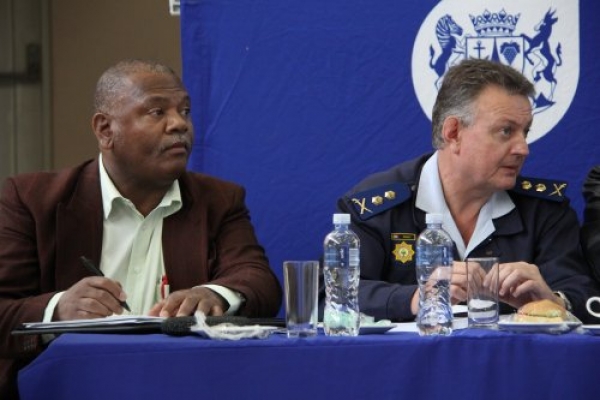Community hotline to Khayelitsha’s top cops

The cell phone numbers of Khayelitsha’s top cops will be posted in newspapers this week in a bid to increase the responsiveness of the police in the area.
Speaking at the Department of Community Safety’s Policing Needs and Priorities meeting for the cluster in Macassar community hall on Saturday, cluster commander Major General JJ Brand said that members of the community would be encouraged to share information with their local station and sector commanders. The lists are to be published in locally read newspapers including Vukani and City Vision.
“My contact details will be included in the list,” he said.
“And I want to promise each member of the community that I will personally take their calls if they do not have luck with their local station and sector commanders.”
In an interview after the meeting, Brand explained that official cellphone numbers for all commanders were publicly available on the police’s website, but that few people knew of these. The main aim for publishing the numbers is a hope that Khayelitsha residents would be more willing to give information to top officials.
“But we also want to encourage people to issue complaints directly to the commanders in charge of their areas,” he said.
“Finally, residents should be encouraged to congratulate the police in general or individual officers if they have received good service from our members. We are glad to hear of a willingness in the community to build trust and open channels of communication.”
Brand was responding to comment from Khayelitsha Education Forum chairman Thembelani Jikelo, who had spoken of a desire in the community to improve communication and trust between residents and the police.
“We want to be able to trust the police and come to them with information that is going to help solve crime,” he said.
“But, the reality is that there are many corrupt officers who cannot be trusted because they are being paid off by the criminals who terrorise the community.”
The Khayelitsha Commission of Inquiry, which published its findings last month, focussed on the breakdown of relations, communication and trust between residents and police in the area. It recommended that the police should publicly pledge to treat people with respect and undertake to respond to calls within specified times.
The commission also put some of the onus on residents, recommending that Community Policing Forums and Neighbourhood Watches in the area should be strengthened. The police should use these platforms to provide feedback on cases and to have regular meetings with other community structures.
Saturday’s meeting, hosted by Dan Plato, MEC for Community Safety, forms part of the provincial government’s annual process of establishing policing needs and priorities in the Western Cape - the report for which will be compiled next year.
Unlicensed shebeens
After presentations by Brand, Plato and some of his department’s staff the floor was open for questions.
Many of the comments from the floor emphasised that other governmental stakeholders should work in conjunction with the police. For example, the Department of Education to help tackle the issue of youth gangs and various City of Cape Town portfolios to improve services, housing and urban planning to make the area safer. Concern over staffing shortages and the need for fast tracking the building of a Makhaza police station were also covered.
Benedicta van Minnen, the City’s Mayco Member for Health, stressed the links between substance abuse and crime. She asked Plato and Brand to provide leadership in closing down unlicensed shebeens in the Khayelitsha. There are 1,400 such taverns in the area, the commission found.
In his closing remarks, Plato responded to the questions and comments, saying that they would all be taken into consideration when the Policing Needs and Priorities report is drafted.
“We want to thank the public and the police for their willingness to co-operate and put measures in place to make Khayelitsha safer,” he said, adding a commitment from provincial government to assist where and when it can.
Support independent journalism
Donate using Payfast

Don't miss out on the latest news
We respect your privacy, and promise we won't spam you.
Next: When rights clash with tradition
Previous: A view across the roofs of Siqalo informal settlement. Photo by Masixole Feni.

This article is licensed under a Creative Commons Attribution-NoDerivatives 4.0 International License.
